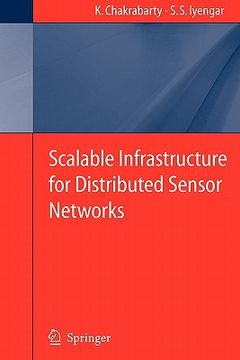Share
scalable infrastructure for distributed sensor networks
S. S. Iyengar
(Author)
·
Springer
· Paperback
scalable infrastructure for distributed sensor networks - Iyengar, S. S.
Choose the list to add your product or create one New List
✓ Product added successfully to the Wishlist.
Go to My Wishlists
Origin: U.S.A.
(Import costs included in the price)
It will be shipped from our warehouse between
Friday, July 19 and
Friday, July 26.
You will receive it anywhere in United Kingdom between 1 and 3 business days after shipment.
Synopsis "scalable infrastructure for distributed sensor networks"
Advances in the miniaturization of microelectromechanical systems have led to battery-powered sensor nodes that have sensing, communication and p- cessingcapabilities. Thesesensornodescanbenetworkedinanadhocmanner to perform distributed sensing and information processing. Such ad hoc s- sor networks provide greater fault tolerance and sensing accuracy and are typically less expensive compared to the alternative of using only a few large isolated sensors. These networks can also be deployed in inhospitable terrains or in hostile environments to provide continuous monitoring and processing capabilities. A typical sensor networkapplication is inventorytracking in factorywa- houses. A single sensor node can be attached to each item in the warehouse. These sensor nodes can then be used for tracking the location of the items as they are moved within the warehouse. They can also provide information on the location of nearby items as well as the history of movement of various items. Once deployed, the sensor network needs very little human interv- tion and can function autonomously. Another typical application of sensor networks lies in military situations. Sensor nodes can be air-dropped behind enemy lines or in inhospitable terrain. These nodes can self-organize th- selves and provide unattended monitoring of the deployed area by gathering information about enemy defenses and equipment, movement of troops, and areas of troop concentration. They can then relay this information back to a friendly base station for further processing and decision making. Sensor nodes are typically characterizedby small form-factor, limited b- tery power, and a small amount of memory
- 0% (0)
- 0% (0)
- 0% (0)
- 0% (0)
- 0% (0)
All books in our catalog are Original.
The book is written in English.
The binding of this edition is Paperback.
✓ Producto agregado correctamente al carro, Ir a Pagar.

